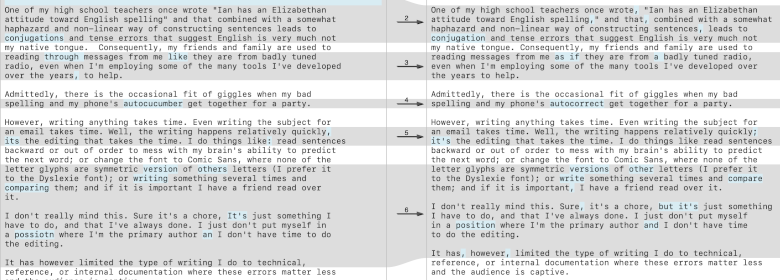How I'm Using an AI (It's Literally Changing My Life)

This blog is made possible partly thanks to a modern large language model, but not in the way you might think. Let me explain:
I'm dyslexic. Okay, that's an understatement. I'm horrendously, depressingly, appallingly dyslexic, sometimes to the point of incomprehensibility.
One of my high school teachers once wrote, "Ian has an Elizabethan attitude toward English spelling," and that, combined with a somewhat haphazard and non-linear way of constructing sentences, leads to conjugations and tense errors that suggest English is very much not my native tongue. Consequently, my friends and family are used to reading messages from me as if they are from a badly tuned radio, even when I'm employing some of the many tools I've developed over the years to help.
Admittedly, there is the occasional fit of giggles when my bad spelling and my phone's autocucumber get together for a party.
However, writing anything takes time. Even writing the subject for an email takes time. Well, the writing happens relatively quickly; it's the editing that takes the time. I do things like read sentences backward or out of order to mess with my brain's ability to predict the next word; or change the font to Comic Sans, where none of the letter glyphs are symmetric versions of other letters (I prefer it to the Dyslexie font); or write something several times and compare them; and if it is important, I have a friend read over it.
I don't really mind this. Sure, it's a chore, but it's just something I have to do, and that I've always done. I just don't put myself in a position where I'm the primary author and I don't have time to do the editing.
Ironically, I do a lot of writing, and I rather enjoy it. This has, however, limited the type of writing I do to technical, reference, or internal documentation where these errors matter less and the audience is captive.
Then along comes ChatGPT and other generative AI tools, and everyone starts using them for everything. So what can it do for me?
After a few attempts handing it bits of my writing, I try the prompt: "You are a friendly editor. Check the following for spelling, grammar, and consistent style without changing the overall voice of the text, and proofread:"
What came back was, to me, amazing. They were my words—just done right! None of the randomness of a spell checker, or the (un)helpful suggestions from a grammar checker, or the attempts to 'punch it up' from a writing assistant, just the red marks I'd normally get from a helpful colleague. All I needed to do was compare the before and after and decide what to keep.

It is hard to describe how game-changing this is. This prompt worked with everything I gave it, giving me back just the errors. It's still labor-intensive by other standards, but compared to what I did before, it's a snap. I can now do the first iteration of editing myself with much higher confidence, and without inconveniencing anyone else.
Even though ChatGPT is just a program, it can get a bit creepy. If there are a lot of errors, then the AI will prepend some really flattering comments about my style or the content! Which you might think is cute, until you realize it is just trying to predict what a real editor would write, and of the many colleagues and editors I've had help, not one has failed to do exactly this: give me some ego-boosting compliment to soften the incoming avalanche of corrections!
Of course, I had to push this further. Next I tried versions of : "You are a critical editor. Discuss the overall voice, flow, and relevance of:"
And again, I was amazed as what came back was a cold, mostly emotionless, discussion of the overall structure, flow, and dyslexic effects on my writing. Usually, it would take three or four editing iterations to get to that.
It doesn't do so well if I ask it to expand its suggestions or give examples of changes it would make, but even those help me focus where my attention should be spent.
Over the years, I've spent a lot of money on tools like grammar checkers and writing assistants, and on human editors, with varying levels of success. Now we have a free-to-use LLM that can do exactly what I need in a matter of seconds.
Editors, the human kind, are really important once a document gets above a certain size, and critical for something the size of a book. However, I've never had much success working with them as the tediousness of first having to translate from Ian-ish to English followed by the distraction of esoteric or highly technical content is just too time-consuming and costly.
But now I have a workflow that can automate much of that tedium, and the few responses I've had so far from friends reading new work bear this out: the spelling discussion is just absent!
So now I've been thinking about the types of writing that I'd just assumed it would never be feasible for me to produce. The prospect of needing a human editor for the bigger stuff is no longer so terrifying now that I can submit manuscripts where English does, in fact, appear to be my native language.